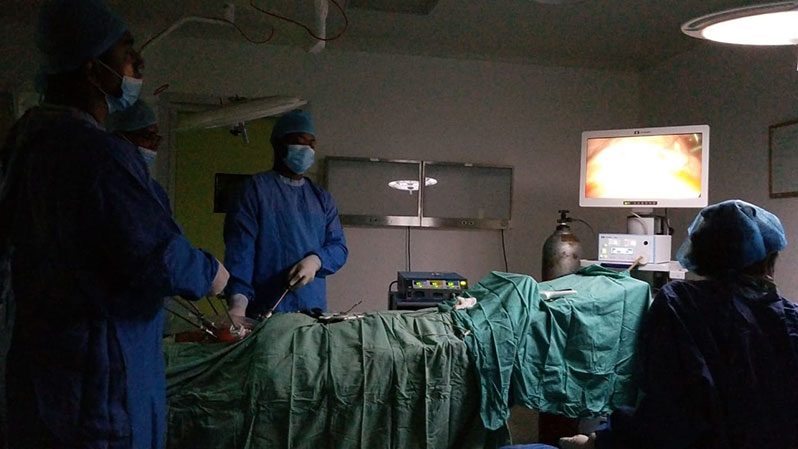THOUGH there have been limitations on surgical procedures due to the COVID-19 pandemic, 40 patients successfully received much-needed hernia repair surgeries during the two-day ‘Operation Hernia’ done at the Georgetown Public Hospital Corporation (GPHC) last weekend.
According to one of the surgeons involved, and registrar of general surgery at the hospital, Dr. Christopher Chung, a hernia is colloquially referred to as a ‘goadie’ but it is actually a weakness in the abdominal wall (the stomach). That weakness causes a protrusion of the intestines or some other organ within the stomach.
The surgeon explained that in males, the hernia can go down into the scrotum and that would prevent individuals from doing any heavy lifting or strenuous work. The hernia surgery, in men and women, involves repairing the damaged tissue with prolene mesh (a type of plastic that helps to strengthen the abdominal walls). This is what is done in Guyana and in many other countries.
Dr. Chung also noted that a primary repair can be done, whereby the body’s own tissue is used for the repair, or it can be done laparoscopically, whereby a small incision is made and a scope is sent through.
“There are a lot of patients that suffer from this condition,” another surgeon and registrar, Dr. Gabrielle DeNobrega highlighted, emphasising: “It affects their work, and if they can’t work, they can’t make money, and they come with a lot of complaints to the clinic, and there is only so much that we can do.”
Prior to COVID-19, about eight hernia surgeries would be done each week by four surgical teams. These surgeries add to all of the emergent and other elective surgeries they would have done throughout the week – whether for wounds incurred due to violence, cancer treatment or otherwise.
This year’s ‘Operation Hernia’ was the third one done; the earlier operations featured about 60 surgeries. The number of surgeries were reduced, however, because of the restrictions imposed due to the COVID-19 pandemic.
“There were four teams involved and they ran all the theatres (at the GPHC). That went from Saturday morning to Saturday evening, and then again on Sunday morning to Sunday evening,” Dr. DeNobrega highlighted.
An average hernia surgery, she explained, takes about 45 minutes to complete. More complicated surgeries or surgeries on patients who are ‘high-risk’ would require a longer surgery. Though this year’s ‘Operation Hernia’ featured patients who required the varying types of attention, the doctor noted that all 40 surgeries were successfully completed.
The COVID-19 pandemic has forced health services to adapt their systems and procedures, due to concerns over the spread of the novel coronavirus. These concerns prompted the hospital to indefinitely postpone elective surgeries – that is, a surgery that does not involve a medical emergency. The medical team have, however, been trying to offer some surgical procedures, particularly to those persons who need it the most.
Before these 40 patients underwent their surgeries, they all had to be screened. Dr. Chung explained that another reason the set of surgeries were done at the weekend was because the screening would only be valid for a short period of time. If too much time has elapsed, there is a greater possibility that the patient could have been exposed to the SARA-CoV-2 virus (that causes the disease, COVID-19).
SOCIO-ECONOMIC IMPACT
Beyond these health considerations, hernias are one type of pathology that cause significant discomfort to persons but it also has a socio-economic impact on patients.
“When we do these kinda things, it’s not just that we’re fixing this hernia- that is just a one-dimensional aspect of what is going on,” Dr. Chung reasoned.
He explained that if a man’s hernia is repaired, the man would be able to return to work, provide for his family and, by extension, contribute to the economy. Additionally, when surgeons are able to operate, they are able to build their repertoire of skills and improve with each additional surgery.
“More surgeries done for the population, for a disease that can cause socio-economic distress, the better the outcome for the economy. It is not about looking at it from a one-dimensional standpoint, but to mesh everything together,” the surgeon emphasised.
And it is for this reason Dr. Chung contended that the team of surgeons did not mind sacrificing their weekend to engage in ‘Operation Hernia.’ Moving forward, both doctors indicated that they have expressed an interest in doing more general surgeries, but doing it in a way where the lives of all the staff – whether medical or supporting staff – can be protected, too. In this regard, Dr. DeNobrega indicated that the National COVID-19 Task Force has already been engaged.
“We’re trying to get things back to normal, but the population just has to understand that there is a new normal… but we are trying to work around all the issues we have right now,” Dr. Chung emphasised.



.jpg)









